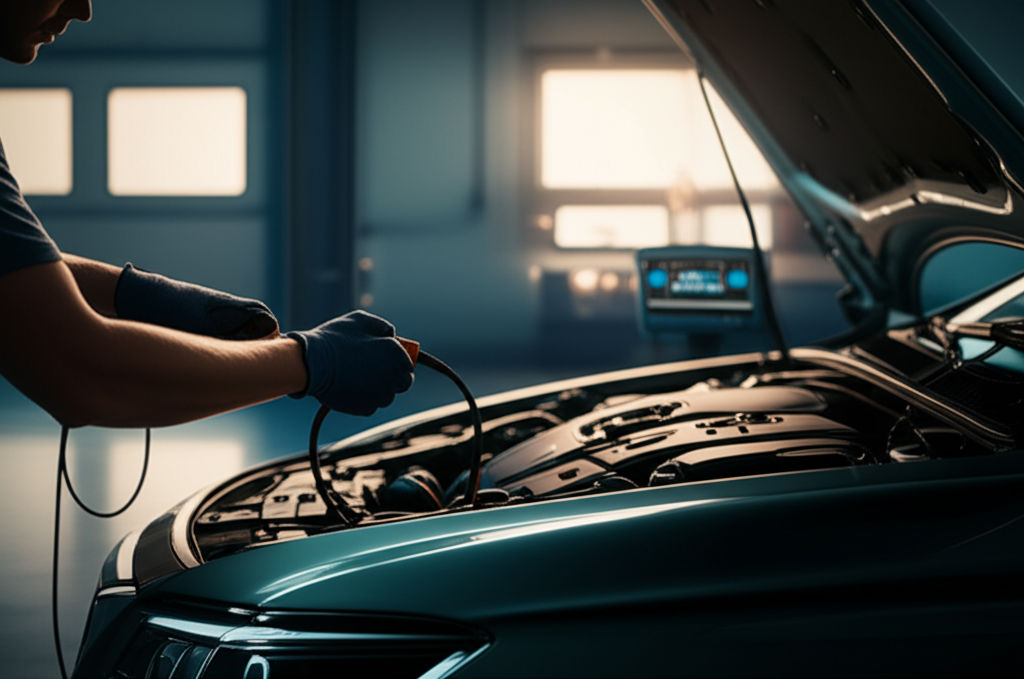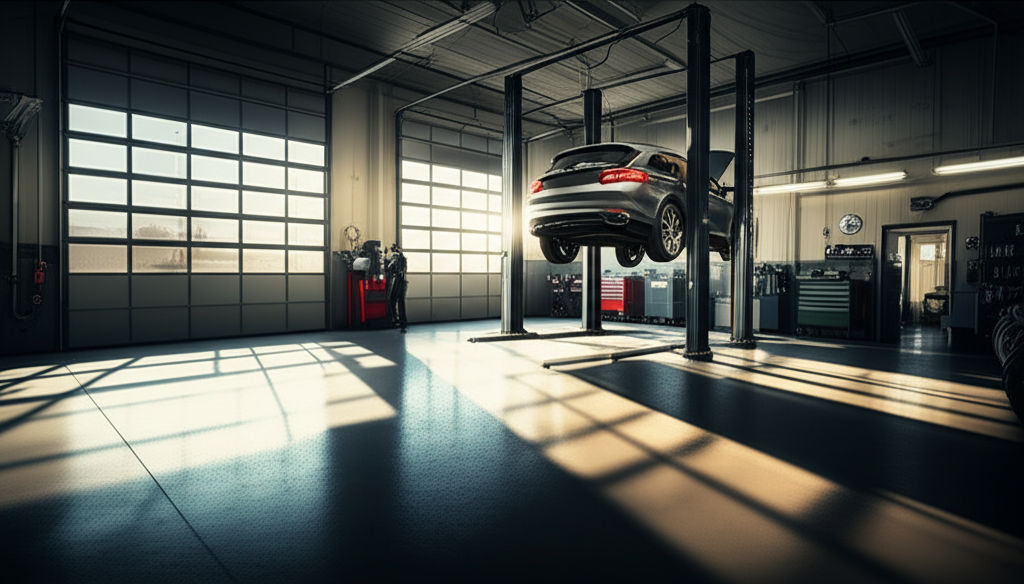How Automotive Flex Enhances Vehicle Performance
Ellie Moore

Photo: Beyond horsepower: explore automotive flex! This engineered balance of rigidity & movement is vital for your car's performance, handling & comfort.
The world of automotive performance is often associated with raw horsepower, cutting-edge aerodynamics, and lightning-fast acceleration. But beneath the gleaming paint and roaring engines lies a less obvious, yet equally crucial, factor: automotive flex. Far from being a mere byproduct of design, engineered flex is a sophisticated concept that plays a pivotal role in how your vehicle performs, handles, and even feels on the road. Understanding this intricate balance of rigidity and controlled movement is key to appreciating the engineering marvel that is a modern automobile.
This article will delve into the fascinating world of automotive flex, exploring how it contributes to vehicle performance, safety, and comfort for the everyday driver. We'll uncover the "why" and "how" behind this critical element, from the foundational chassis to the subtle movements of your tires.
Beyond the Obvious: What is Automotive Flex?
When we talk about "automotive flex," we're not just referring to undesirable bending or weakness. Instead, it encompasses the controlled deformation and movement within a vehicle's various components and overall structure. Think of it as a finely choreographed dance between rigidity and pliability, where each movement serves a specific purpose to optimize the driving experience. This concept is central to vehicle dynamics, influencing everything from how a car takes a corner to how comfortably it glides over bumps.
The industry term "torsional rigidity" (often used interchangeably with "torsional stiffness") is a key aspect of automotive flex, referring to how much a vehicle's chassis resists twisting forces. A more rigid chassis provides a stable foundation for the suspension, allowing it to work efficiently and predictably.
The Chassis and Body: The Foundation of Performance
The chassis, or the vehicle's underlying frame, is the backbone to which all other components are attached. Its rigidity is paramount. Imagine trying to run on a wobbly ladder; your efforts would be inefficient and unstable. Similarly, if a car's chassis is too flexible, it can act as an "unpredictable fifth spring" in the suspension system. This uncontrolled flex can lead to:
- Delayed Steering Response: When the chassis twists, it can subtly alter steering alignment, making the car feel less direct and responsive to driver input.
- Reduced Cornering Ability: Chassis flex can cause the suspension geometry to become suboptimal during hard cornering, leading to a loss of grip and predictability.
- Unpredictable Behavior: Energy stored and released by a flexing chassis can make a vehicle feel like it has "a mind of its own," especially during dynamic maneuvers.
Therefore, a high degree of torsional rigidity is highly desirable for performance vehicles. It ensures that the forces generated by the tires are effectively transferred to the car's mass, resulting in more precise and responsive handling. This is why race car builders and OEM designers consistently aim for stiffer chassis designs.
The Dance of Suspension: Controlled Flex for Comfort and Control
While a stiff chassis is crucial, the suspension system is where engineered flex truly shines for both performance and comfort. The suspension is designed to absorb shocks and bumps from the road, preventing them from reaching the vehicle's body and passengers. This is achieved through the controlled flexing and movement of components like:
- Springs: These absorb the initial impact of road imperfections.
- Shock Absorbers (Dampers): These control the oscillations caused by the springs, preventing excessive bouncing.
- Control Arms and Bushings: These components allow the wheels to move independently while maintaining proper alignment and minimizing body roll.
A well-tuned suspension system utilizes flex to:
- Maintain Tire Contact: By allowing wheels to move independently, especially over uneven terrain, the suspension ensures all four tires remain in contact with the road, maximizing traction and stability.
- Improve Ride Quality: The ability of suspension components to flex and absorb impacts translates directly into a smoother, more comfortable ride for occupants, reducing vibrations and harshness.
- Enhance Handling: Controlled suspension flex allows for precise wheel movement, ensuring optimal tire angles for grip during cornering and braking.
Tires: The Unsung Heroes of Flex and Grip
Often overlooked, the tires themselves are critical components of automotive flex. Their sidewalls are designed to flex and deform, playing a significant role in both ride comfort and handling dynamics.
- Flexibility and Cushioning: Tire sidewalls absorb shocks from the road, providing a smoother ride and cushioning for passengers. A softer sidewall provides a much smoother ride as it can flex and absorb bumps.
- Steering Responsiveness: The amount of sidewall flex directly impacts steering precision. Lower sidewall heights generally mean stiffer sidewalls and faster turning responsiveness, which is why race cars often feature very low-profile tires.
- Contact Patch Management: Sidewall flex allows the tire to maintain a consistent contact patch with the road surface, which is vital for grip during cornering, acceleration, and braking.
However, there's a trade-off. While a softer sidewall offers more comfort, it can sacrifice handling and stability, especially during high-speed cornering, as the tire can "wobble a bit". Performance tires typically feature sturdier sidewalls to provide better control over the contact patch and resist lateral forces.
Material Science: Engineering Flex for Optimal Results
The materials used in a vehicle's construction significantly influence its flex characteristics. Automotive engineers meticulously select and combine materials like high-strength steel, aluminum, and carbon fiber to achieve the desired balance of rigidity, weight, and controlled deformation.
- Lightweighting: Advanced materials allow manufacturers to reduce overall vehicle weight, which improves fuel efficiency and performance. However, this must be balanced with maintaining structural integrity and engineered flex.
- Crash Safety: Modern vehicles incorporate crumple zones, which are areas designed to deform in a controlled manner during a collision. This engineered flex absorbs impact energy, protecting occupants. A stiff chassis also contributes to overall safety by maintaining structural integrity during a crash.
- Durability: Materials are chosen not just for their stiffness or flexibility, but also for their ability to withstand repeated stress and flex cycles without fatigue, ensuring the longevity of components.
How Controlled Flex Translates to Enhanced Performance
Now that we understand the various facets of automotive flex, let's explore how this engineered characteristic directly enhances vehicle performance in real-world scenarios.
Sharper Handling and Steering Precision
A vehicle with optimally managed flex will respond more precisely to driver inputs. When the chassis is rigid, the suspension components can work as intended, keeping the tires firmly planted on the road. This translates to:
- Direct Steering Feel: Drivers experience a more immediate and accurate response from the steering wheel, making the car feel more connected to the road.
- Predictable Cornering: With minimal unwanted chassis flex, the suspension geometry remains consistent, allowing the tires to maintain optimal grip through turns. This predictability boosts driver confidence and allows for higher cornering speeds.
- Improved Stability: A stiff chassis provides a stable foundation, reducing body roll and improving overall vehicle stability, especially during rapid maneuvers or at high speeds.
Superior Ride Comfort and Passenger Experience
While performance often implies a harsh ride, optimized automotive flex actually enhances comfort. The suspension system, through its controlled flex, isolates the cabin from road imperfections.
- Shock Absorption: Springs and dampers work in harmony to absorb bumps, potholes, and vibrations, preventing them from jarring the occupants.
- Reduced Noise, Vibration, and Harshness (NVH): A stiff chassis, combined with well-designed suspension components, helps to dampen unwanted vibrations and noise, creating a quieter and more refined cabin environment. This is crucial for long-distance comfort and overall driving pleasure.
- Smoother Transitions: Whether accelerating, braking, or turning, engineered flex ensures a smooth transfer of forces, minimizing abrupt movements and enhancing the overall passenger experience.
Enhanced Safety and Crash Protection
Beyond dynamic performance, automotive flex is a cornerstone of vehicle safety.
- Structural Integrity: A rigid chassis is less prone to permanent deformation under various driving conditions, maintaining the vehicle's structural integrity over time.
- Controlled Deformity in Collisions: In the event of a crash, specific areas of the vehicle are designed to absorb impact energy by deforming in a controlled manner. This engineered flex, within crumple zones, protects the passenger compartment by dissipating kinetic energy away from the occupants.
- Predictable Emergency Maneuvers: Just as with performance handling, predictable chassis and suspension flex allows a vehicle to respond reliably during sudden braking or evasive steering maneuvers, helping the driver maintain control and avoid accidents.
Improved Durability and Longevity
The careful management of flex also contributes to the long-term durability of a vehicle.
- Reduced Component Stress: When forces are properly distributed and absorbed by designed flex points, individual components are subjected to less stress and strain, leading to a longer lifespan for parts like suspension linkages, bushings, and even engine mounts.
- Preserved Alignment: A chassis that resists twisting helps maintain suspension alignment, which reduces premature tire wear and stress on steering components.
The Balancing Act: Too Much vs. Too Little Flex
Achieving the optimal level of automotive flex is a delicate balancing act for engineers. It's not simply about making everything as stiff as possible; rather, it's about strategic rigidity combined with controlled, purposeful movement.
The Dangers of Excessive Flex
While some flexibility is necessary, excessive or uncontrolled flex in the chassis is detrimental to performance and safety. As discussed, it can lead to:
- Poor Handling and Predictability: A "soft" chassis can make a car feel vague, unresponsive, and difficult to control, especially at speed or during hard cornering. It can change suspension settings and make handling less predictable [27
Finance & Investment
View All
April 14, 2025
Best Finance Companies Near YouElevate your SEO content! Learn to create expert content that ranks high, helps users, and builds trust with Google's E-E-A-T framework.
Ellie Moore

March 27, 2025
Value vs. Growth Investing: What’s the Difference?Compare value investing and growth investing strategies. Discover their key differences and decide which suits your financial goals best.
Ellie Moore

April 24, 2025
Best Car Financing Rates TodayCraft expert SEO content to dominate search rankings. Our guide reveals how to build authority, trust, and E-E-A-T for lasting online success.
Ellie Moore

October 25, 2025
Student Finance Tips for 2025Unlock top rankings with expert SEO content! Learn to craft high-value, E-E-A-T-driven articles that satisfy user intent & dominate search.
Ellie Moore

June 5, 2025
Chase Auto Finance Contact InfoMaster expert SEO content to build authority & drive organic traffic. Create valuable, credible content that ranks high, satisfies user needs, and establishes y...
Ellie Moore

February 4, 2025
Finance Calculator for PlanningCreate expert SEO content that ranks high and engages! Learn to blend user needs, E-E-A-T, and strategy to provide real value and stand out online.
Ellie Moore
Insurance
View AllWhy are millennials delaying life insurance? Explore the trends and factors influencing their decisions.
Ellie Moore
Learn how high-net-worth individuals get specialized insurance tailored to unique assets and risks. Discover luxury coverage!
Ellie Moore
Safeguard your assets with our guide to Complete Safeco Insurance Coverage. Understand options, compare quotes, and get peace of mind.
Ellie Moore
Secure your home with premium insurance. This guide helps you navigate quotes, find comprehensive protection, and achieve peace of mind against unforeseen damag...
Ellie Moore
Secure your home & finances! Our guide to essential house insurance helps you protect your most valuable asset with smart, informed decisions.
Ellie Moore
Secure your pet's health and your budget. Learn how Top-Rated Spot Pet Insurance provides financial protection and peace of mind for unexpected vet costs.
Ellie Moore
Education
View AllDifferentiated instruction helps teachers reach diverse learners. Find out how tailored teaching improves outcomes for every student.
Read MoreDiscover how flipped classrooms work and why they’re becoming popular. Learn the key benefits of this innovative teaching approach.
Read MoreUnderstand dyslexia and discover effective ways to support dyslexic students in the classroom. Learn proven strategies to improve learning outcomes.
Read MoreUnderstanding memory is key to better teaching. Learn how memory functions and how to use this knowledge to enhance teaching techniques.
Read MoreUnschooling is redefining education. Learn how this self-directed approach works and why more families are embracing it as an alternative to traditional schooling.
Read MoreDifferent cultures approach early education in unique ways. Discover how cultural values shape learning practices for young children around the world.
Read MorePopular Post 🔥
View All
1
2
3
4
5
6
7
8
9
10
Health






Automotive
View All
August 27, 2025
What To Expect From Precise Automotive Group
Expect the best from Precise Automotive Group: certified experts, transparent pricing, and trusted auto care for your vehicle's long-term health.

August 15, 2025
Upcoming Automotive Expos You Should Attend
Experience the future of cars firsthand! Automotive expos showcase cutting-edge tech, designs, & EVs. Compare models & network with experts.

February 10, 2025
Electric Motorcycles: The Future of Two-Wheel Rides
Are electric motorcycles the next big thing? Explore the latest models, benefits, and how they compare to traditional bikes. Ready to switch gears?

August 24, 2025
Hayes Automotive Top Repairs And Diagnostics
Demystify car troubles! Discover expert diagnostics & repairs for common vehicle issues, ensuring peace of mind & superior automotive care.

September 11, 2025
J&M Automotive Naugatuck Services Reviewed
J&M Automotive Naugatuck: Beyond used cars, find a comprehensive service center for expert maintenance & repairs by ASE-certified technicians.

September 8, 2025
Direct Automotive Services Done Right
Get convenient, quality car care at your location! This guide helps you choose reliable direct automotive services for hassle-free vehicle maintenance.

















